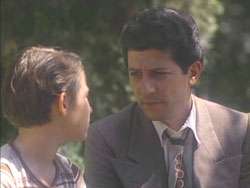One Life, Furnished in Early Poverty
"One Life, Furnished in Early Poverty" is the second segment of the eleventh episode from the first season (1985-1986) of the television series The Twilight Zone.
| "One Life, Furnished in Early Poverty" | |
|---|---|
| The Twilight Zone (1985 series) episode | |
 scene from One Life, Furnished in Early Poverty | |
| Episode no. | Season 1 Episode 11b |
| Directed by | Don Carlos Dunaway |
| Written by | Alan Brennert (Based on the short story by Harlan Ellison) |
| Original air date | December 6, 1985 |
| Guest appearance(s) | |
Peter Riegert: Gus Rosenthal | |
Opening narration
He had to go back; it was that simple. Back to the place where his anger had first taken root. Back to find the turning point which had set him on the road to success . . . and loneliness. Because here, in a small Ohio town, lived the shadows of the boy he used to be and the man he could have become. Gus Rosenthal is returning home . . . to the Twilight Zone.
Plot
Gus is an angry middle aged man who is dissatisfied with his life. One day, a toy soldier of his breaks and he realizes he must travel to his old house in Ohio to bury it. While Gus sits under a tree he is transported back to the 1940s where he views himself as a child, and he finds himself dressed in a suit like those worn by men of that era.
Gus follows his younger self and saves him from bullies. They strike up a friendship and he tries to act like a go-between for young Gus and his father. He tells young Gus how he decided he would be successful and famous when he grew up, and he helps young Gus become interested in reading. Young Gus's dad Lou eventually confronts Gus and tells him he is jealous of the relationship he has with his son.
Lou tries to explain that he can't understand young Gus, and Gus tells him he only need to listen to his son and let him know that he loves him. Gus explains to Lou that he and his father didn't have a good relationship and his father died early. Gus admits that he wanted to give young Gus a chance. Lou tells him that he is a good man and that he is happy he has been a part of their lives.
Gus tells his younger self that he has to leave and go back to his life in Los Angeles. He tries to explain that he cannot return as he is ill. Younger Gus becomes angry and runs away, cruelly pronouncing that he will become "a big something" when he grows-up and spit on Gus if he is ever reunited with him. Gus recalls in a predestination paradox he was once angry with a man just like his full-grown self. Gus is returned to the present, and recalls that he would never be happy until he could show up his father and the bullies. Gus was glad to make peace with his father, and most of the bullies are probably dead by now. Ultimately, it is upon himself to be happy. Gus hails a cab to go to the airport, and recites the name on the taxi license as one of the old bullies. When the driver asks if he knew him, Gus replies "Not anymore".
Closing narration
It's rather bittersweet how we spend so much time trying to justify ourselves to the shadows of those who are long gone. And even if they were alive, would they remember? Would they recall what they had said or done that made you spend the rest of your life proving yourself? And if you could go back, wouldn't you learn that you were always the master of your fate? And if you learned that great truth, wouldn't it free you of a useless burden. Dead cargo...from the Twilight Zone.
Note
This episode is based on the short story "One Life, Furnished in Early Poverty", by Harlan Ellison. The story was first published in the anthology Orbit 8 in 1970. It is similar to the original series episode from 1959 called Walking Distance.